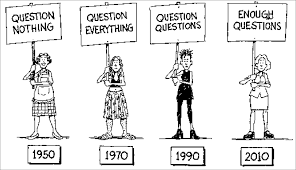Google Generation X and you find this definition: the generation born after that of the baby boomers (roughly from the early 1960s to late 1970s), typically perceived to be disaffected and directionless.
The first part of this sentence is easy to understand, but the last half? Surely that can’t be right? Wikipedia gives us more insight: Members of Generation X were children during a time of shifting societal values and as children were sometimes called the “latchkey generation”, due to reduced adult supervision as children compared to previous generations, a result of increasing divorce rates and increased maternal participation in the workforce, prior to widespread availability of childcare options outside the home. As adolescents and young adults, they were dubbed the “MTV Generation” (a reference to the music video channel of the same name). In the 1990s they were sometimes characterized as slackers, cynical and disaffected. Some of the cultural influences on Gen X youth were the musical genres of grunge and hip hop music, and indie films. In midlife, research describes them as active, happy, and achieving a work–life balance. The cohort has been credited with entrepreneurial tendencies.
What’s for sure is that it is this generation of community development practitioners who are now taking over the leadership roles in our field as the Baby Boomers retire. As we posted with reference to May 1968, it was the social and cultural changes in late sixties and seventies that proved the formative influence over the students and young people who moved into community development careers in the 1970s.

Generation X entered our profession and movement in the late 1990s and 2000’s and may now be moving into senior positions in development agencies, in policy influence and in the Higher Education institutions that dominate the education and training in community development. For them the Neo-con ideological challenge to the Post WW2 consensus that had seen the earlier growth in state funded and employed community development posts in the 1960s and 70s, has changed profoundly reflecting cuts in these posts by governments across the world as they became less interventionist.
In contrast for the Generation X community developers, the main community development employers have been NGOs or CBOs (community based organisations), or self employment as community development consultants, reflecting the huge growth in community enterprises and social entrepreneurs from the latter 1980s. Their jobs have however been less secure than the Baby Boomers and remain generally more short term and less well paid (unless you happen to end up running one of the large international NGOs such as Oxfam).
Has the Neo-con revolution and the emergence of far less secure employment environment for Generation X community development practitioners reduced their radicalism as community organisers and community educators? Or has it liberated practitioners to become more critical of local and national state development programmes and policies and those of international agencies such as the World Bank, with its promotion of community-led development, suggesting less need for professional community development support for vulnerable communities? Perhaps a mix of both. There is a need for some research here.

IACD itself is now increasingly led by the Generation X cohort, with the Baby Boomers retiring. And our decision earlier this year to have Youth Reps, ‘the Millennials’, who are just starting their community development careers will give them an increasing say. Baby Boomer, Generation X, Millennial are of course huge generalisations. And the social and cultural influences referred to above by Wikipedia have not been the same in all countries. But it may give pointers to the sorts of priorities our membership and leadership will be giving in the years ahead.
Watch this space!

